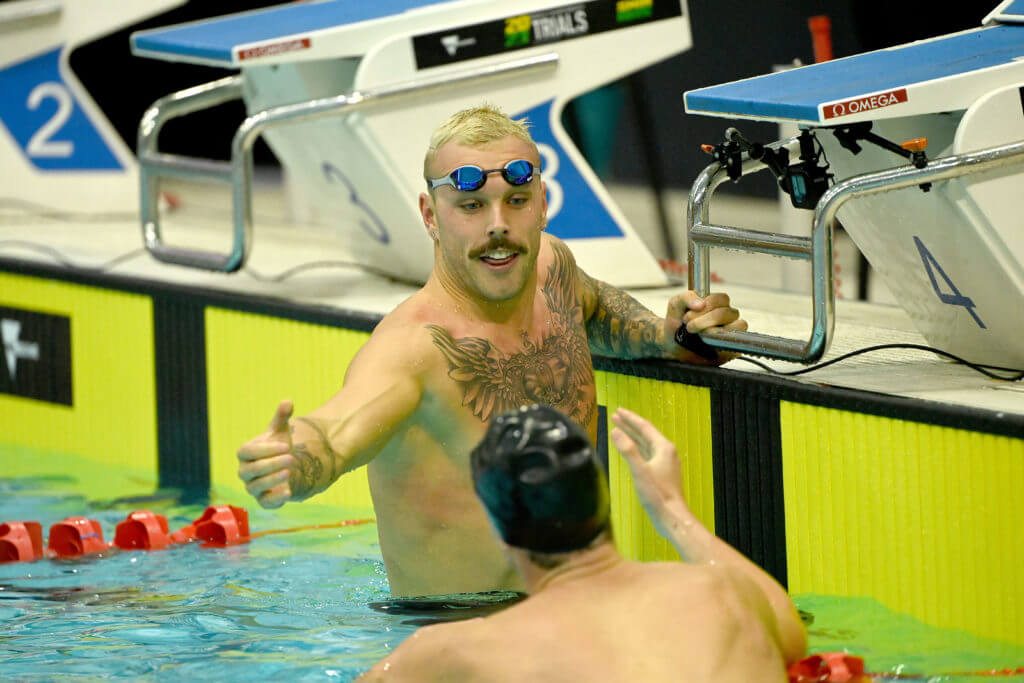Australian Men Again Assemble Medal-Contending Freestyle Relays

Editorial content for the 2023 World Aquatics Championships is sponsored by FINIS, a longtime partner of Swimming World and leading innovator of suits, goggles and equipment.

Australian Men Again Assemble Medal-Contending Freestyle Relays
For the third consecutive year, Australia will head to the year’s major international competition favored for gold in both women’s freestyle relays. That title is nothing new in the 400 free relay, in which the Aussies have won three consecutive Olympic gold medals, but success in the 800 free relay has been more fleeting. After winning a 2019 world title in world-record time, Australia fell short at the 2021 Olympics and 2022 World Championships but rebounded after the latter meet to set a world record at the Commonwealth Games. There will be more time to break down that event and a likely clash with the United States after next week’s U.S. Nationals.
Meanwhile, Australian men’s relays are typically underrated compared to their oft-golden female counterparts, but entering the Fukuoka World Championships, Australia has reached the podium in both free relays at three consecutive major competitions. It helps that Kyle Chalmers, the 2016 Olympic champion in the 100 free, has become one of the most consistent and clutch relay swimmers in the world, but strong teams around him are critical in the medal hunt, especially with an often-rotating cast.
Last year, the Aussies were World Championships silver medalists in the men’s 400 free relay, with Chalmers anchoring in 46.60 (fastest in the field) to move his team up from fifth. He was joined on that team by William Yang, Matt Temple and Jack Cartwright, but Yang will be absent this year after undergoing surgery to remove a tumor in his spinal canal. But arriving on the scene is a teenager who just cut a half-second from his best time last week in Melbourne.
Flynn Southam, just 18, got his first international exposure with three relay gold medals at the Commonwealth Games, and while Chalmers won Trials in a swift time of 47.44, Southam took second in 47.77. The two men currently rank second and sixth in the world, respectively. Cartwright was third in 48.50, but he swam as fast as 48.21 in prelims. Kai Taylor (48.60) and Temple (48.82) were fourth and fifth, respectively. Taylor went 48.41 at the Australian Championships in April, and Temple split 48.17 in last year’s relay final.
Star-power, check, and depth, check. The composite of the top four flat-start times so far this year (Chalmers, Southam, Cartwright and Taylor) equates to 3:11.83. Drop about a half-second for each of the three relay exchanges, and that’s well into the 3:10-range it will likely take to win a medal at Worlds. The United States is the only country to eclipse 3:10 in recent years, and with Caeleb Dressel’s form uncertain entering the upcoming American Nationals, Australia could end up in the mix for gold.
And there is a wildcard: the Australian-record holder and fifth-fastest performer ever is on the team. That’s not Chalmers or anyone already listed as an obvious relay possibility. It’s Cameron McEvoy, who went 47.04 in 2016 to become the gold-medal favorite for the Rio Olympics. McEvoy ended up seventh in that final, and he was never again a serious medal contender internationally. In his most recent international race, he was dropped from Australia’s 400 free relay finals squad at the Tokyo Olympics.
But after a year off, McEvoy reemerged at Trials with a vengeance, winning the 50 butterfly in 23.07 and then topping the 50 free in 21.41. His prelims time of 21.27 tied him for 10th on the all-time list in the event. McEvoy, now 29, did not race the 100 free at Trials, so it’s unclear what he’s capable of in the two-lap race. Still, it would be foolish to not consider him as a possibility for the quartet given his resurgence over one lap and his history in the longer race.
As for the 800 free relay, three of the four men who helped Australia to 800 free relay silver at last year’s World Championships were out of the picture in the Trials 200 free final. Zac Incerti missed the meet because of a shoulder injury, knocking him out of Worlds contention, and veteran Mack Horton was 22nd in the event at 1:51.04. Sam Short skipped the 200 free, but he did race at the meet, emerging with three victories in the 400, 800 and 1500 free. Short will absolutely be in the mix to rejoin this group in Fukuoka.
Chalmers, meanwhile, had the top prelims time at 1:46.97, but he scratched the final, allowing Taylor, who had finished ninth in prelims, to move into the final, and from lane eight, this 19-year-old stunned the field and took first with a time of 1:46.25. Alexander Graham edged out Thomas Neill and Elijah Winnington for second, with all three hitting 1:46-high performances. Winnington, the reigning world champion in the 400 free, is the lone returner from last year’s group.
Technically, the team would be those four men, but we cannot forget about Short, Chalmers or Southam, who owns a personal best of 1:46.24. The teenager swam almost a second slower than that time at Trials — and then two days later, he hit his sub-48 breakthrough in the 100 free. It seems unlikely that his 100 would improve so much while his 200 regresses, so perhaps Southam will have a surprise in store in Fukuoka.
That’s two likely relay medals for the Australian men at Worlds, just like last year and just like the Tokyo Olympics. And also like last year, the Australians will be huge favorites in the mixed 400 freestyle relay. Chalmers and Southam teamed with Mollie O’Callaghan and Emma McKeon? Not even the Americans can construct a team to match.


- MEET HOMEPAGE
- COMPETITION SCHEDULE
- ENTRY LISTS
- 2022 WORLD CHAMPIONSHIPS
- LIVE RESULTS
- DAY 1 PRELIMS RESULTS
- DAY 1 FINALS RESULTS
- DAY 2 PRELIMS RESULTS
- DAY 2 FINALS RESULTS
- DAY 3 PRELIMS RESULTS
- DAY 3 FINALS RESULTS
- DAY 4 PRELIMS RESULTS
- DAY 4 FINALS RESULTS
- DAY 5 PRELIMS RESULTS
- DAY 5 FINALS RESULTS
- DAY 6 PRELIMS RESULTS
- DAY 6 FINALS RESULTS
- DAY 7 PRELIMS RESULTS
- DAY 7 FINALS RESULTS
- DAY 8 PRELIMS RESULTS
- DAY 8 FINALS RESULTS




Great Britain’s men will win both the 4×100 and 4×200 relays – easy work
Great Britain are favoured to win the 4×100 every year but never have